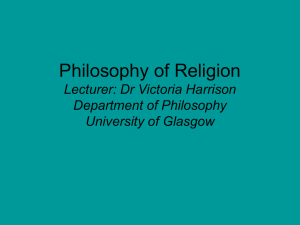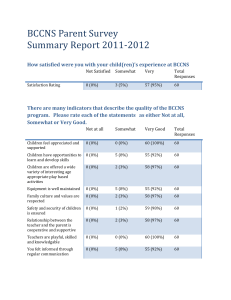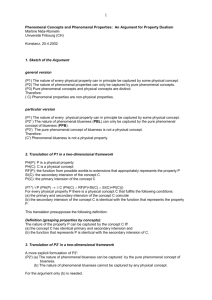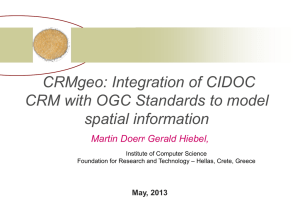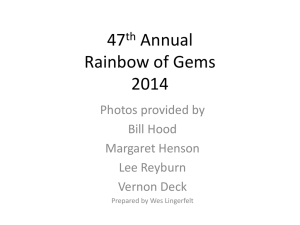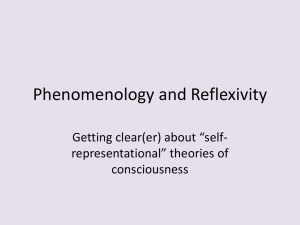On the Generality of Experience: A Reply to French
advertisement
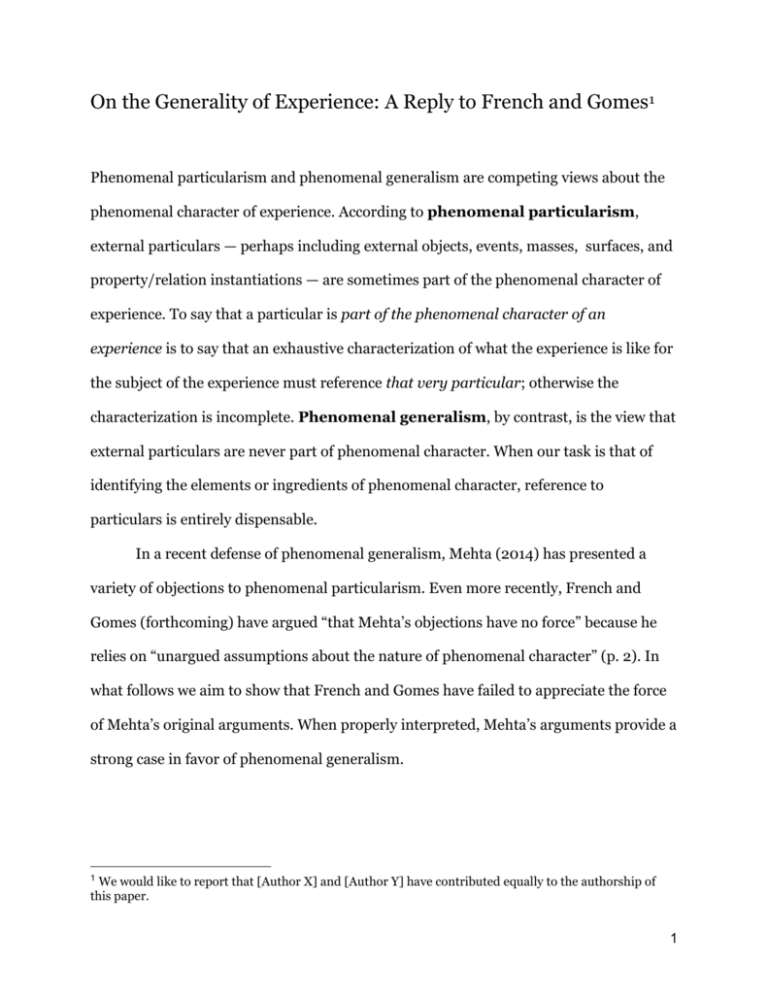
On the Generality of Experience: A Reply to French and Gomes1 Phenomenal particularism and phenomenal generalism are competing views about the phenomenal character of experience. According to phenomenal particularism, external particulars — perhaps including external objects, events, masses, surfaces, and property/relation instantiations — are sometimes part of the phenomenal character of experience. To say that a particular is part of the phenomenal character of an experience is to say that an exhaustive characterization of what the experience is like for the subject of the experience must reference that very particular; otherwise the characterization is incomplete. Phenomenal generalism, by contrast, is the view that external particulars are never part of phenomenal character. When our task is that of identifying the elements or ingredients of phenomenal character, reference to particulars is entirely dispensable. In a recent defense of phenomenal generalism, Mehta (2014) has presented a variety of objections to phenomenal particularism. Even more recently, French and Gomes (forthcoming) have argued “that Mehta’s objections have no force” because he relies on “unargued assumptions about the nature of phenomenal character” (p. 2). In what follows we aim to show that French and Gomes have failed to appreciate the force of Mehta’s original arguments. When properly interpreted, Mehta’s arguments provide a strong case in favor of phenomenal generalism. We would like to report that [Author X] and [Author Y] have contributed equally to the authorship of this paper. 1 1 1. A Problem for Phenomenal Particularists It is important to be clear from the start about why phenomenal particularism ought to be taken seriously. Phenomenal particularism is not needed to explain our ability to discriminate particular objects from one another. Generally speaking, we can account for our ability to discriminate numerically distinct objects from one another by appeal to perceptible differences in the properties of those objects. We can set aside cases where numerically distinct objects possess all the same perceptible properties and relations, for these objects will be perceptually indiscriminable from one another.2 (Subjects will perform at chance when confronted with the task of differentiating between two numerically distinct stimuli having all the same properties and relations.) To see why phenomenal particularism is prima facie plausible, we have to look elsewhere. Consider first the fact that our phenomenally conscious sensory states serve as the fundamental source of de re thoughts about particulars. Why are phenomenally conscious sensory states capable of yielding de re thoughts about particulars? One natural suggestion is that particulars themselves are parts (ingredients or constituents, perhaps) of the phenomenal character of sensory experience. The idea is that an aspect of phenomenal character itself grounds the subject’s capacity to have de re thoughts about the particular perceived: the subject is in a position to have de re thoughts about the particular before her because that very particular is part of her experience. Phenomenal particularism provides similar guidance in thinking about some other basic questions about experience. Suppose you are seeing a cat under good viewing conditions. Why do you see that particular cat rather than some cat or other? Phenomenal particularism is compatible with this claim. For one thing, the phenomenal particularist can insist that some phenomenal differences are indiscriminable. 2 2 Why does your visual experience afford knowledge of the cat and its particular features (its shape, size, color, etc)? Why does your experience seem, from your first-person point of view, to present you with an external particular and its particular features? Phenomenal particularism supplies a natural starting point in addressing these questions. In each case it is plausible that the particularity of experience is playing a key role. We begin to make sense of basic aspects of experience on the assumption that particulars are parts of experience. Mehta (2014) acknowledges these strengths of phenomenal particularism, but he argues that the view has unacceptable consequences. We begin with the argument that Mehta regards as most damaging against phenomenal particularism. Consider two presentations of one and the same glass of red wine under perfectly ordinary conditions. On one occasion the wine is presented in such a manner that the subject is limited to visually inspecting the wine. On a different occasion the wine is poured on the subject’s lap: it is felt but not seen. On the phenomenal particularist view, these two experiences of the wine will have something in common as far as their phenomenal character is concerned. After all, the phenomenal character of both experiences share the very same part, the same portion of wine. The problem is that these two experiences need be nothing alike as far as their phenomenal character is concerned. We take this point to be obvious upon reflection. French and Gomes (forthcoming) have misunderstood the point of Mehta’s wine example and have consequently failed to appreciate the challenge posed by the example. They take Mehta to be reasoning as follows. The two experiences should have exactly the same phenomenal character on the assumption that the very same particulars are involved (same portion of wine and same property instances). But the two experiences 3 differ from one another, so phenomenal particularism should be rejected. French and Gomes go on to show that the phenomenal particularist has the resources to explain why the experiences would differ from one another in phenomenal character. We agree that the phenomenal particularist can explain why the experiences would differ. However, Mehta’s worry about phenomenal particularism is not that the view predicts no phenomenal differences between the two experiences where there are some; rather, the worry is that the view mistakenly predicts at least one phenomenal similarity where there are none.3 There is no similarity in what the two experiences are like for the subject, but phenomenal particularism predicts at least one similarity in virtue of the fact that these are experiences of the same portion of wine. In other words, the phenomenal particularist incorrectly treats the wine case like a case in which the subject sees a scarlet circle and then sees a scarlet triangle. 2. A Second Problem Mehta (2014) raises another objection, which turns on a comparison of two experiences. In the first experience, the subject — who is stipulated to be an ideal imaginer, capable of picturing a scene with perfect clarity and stability — visually imagines a snow-covered tree, but no tree in particular. In the second experience, the same subject sees a snowcovered tree which happens to have precisely the features of the previously imagined tree. These experiences, Mehta takes it, have at least some overlap in phenomenal character. French and Gomes appeal to Campbell (2011), who does indeed adequately respond to the first worry. Mehta’s point is that he, like any phenomenal particularist, remains vulnerable to the second worry. 3 4 In the first instance, this example is intended to undermine a certain version of phenomenal particularism — call it clean phenomenal particularism — on which the phenomenal character of any experience displaying particularity (like the subject’s experience when she sees the tree) is composed wholly of particulars, while any experience not displaying particularity (like the subject’s experience when she visually imagines the tree) is composed wholly of non-particulars. Clean phenomenal particularism cannot accommodate the similarity in phenomenal character across the two experiences of the ideal imaginer, since particulars are not identical or relevantly similar to non-particulars. Clean phenomenal particularism matters because, though its account of phenomenal character is ontologically disunified across different experiences, it is at least ontologically unified within any given experience: the phenomenal character of any given experience includes either particulars alone or non-particulars alone. The failure of this view therefore shows that the phenomenal particularist must pay a further price: she must posit substantial ontological disunities even within the phenomenal character of a single experience. The phenomenal generalist need not pay such a price, as Mehta goes on to argue. In response to this objection, French and Gomes begin by repeating their earlier misunderstanding. They take the objection to be that “[certain] imaginative experiences have the same phenomenal character as perceptual experiences” (p. 6, emphasis ours); formulations of this sort are repeated several times. But this is not the objection, and indeed Mehta is later careful to leave open the possibility that the phenomenal character of perceptual experiences might have a presentational aspect not found in the phenomenal character of imaginative experiences (p. 324). The objection requires only 5 the claim that these experiences have certain similarities in phenomenal character — just one will do. But French and Gomes resist the objection for an additional reason. They concede that for the ideal imaginer these experiences may introspectively appear to have substantial phenomenal similarities, but they resist any inference to the conclusion that the experiences actually have these phenomenal similarities.4 After all, phenomenal particularists already must deny similar sorts of inferences regarding successful perceptual experiences and “matching” hallucinatory experiences: though the subject may be unable to distinguish the two introspectively, according to the phenomenal particularist these experiences differ radically in phenomenal character. If there is a price here, French and Gomes appear to think, then it has already been paid: “... it’s unclear to us how the case of the ideal imaginer is meant to improve on the case of subjectively indistinguishable hallucinations ...” (p. 6). In fact, however, skepticism about introspective knowledge of the phenomenal character of such imaginative experiences is much more extreme than skepticism about introspective knowledge of the phenomenal character of hallucinatory experiences. We take for granted the very modest claim that subjects are sometimes in a position to know about some aspects of the phenomenal character of their experiences by introspection alone, and we believe that any phenomenal particularist should and will take this small step with us. We are also willing to grant the phenomenal particularist, just for the sake of argument, that certain features of phenomenal character cannot be known by introspection alone. But whenever some aspect of the phenomenal character of a given Again, they couch the point in terms of phenomenal sameness rather than similarity, but we will reconstruct all of their remaining arguments modulo this misunderstanding. 4 6 experience cannot be known by introspection alone, a complete theory must explain why that aspect of phenomenal character (unlike some others) is introspectively unknowable.5 Mehta’s objection relies on the thought that the phenomenal particularist has no good explanation of the alleged phenomenal unknowability regarding the imaginative experience in question — not, as French and Gomes claim, on the bold thought that the “phenomenal character of experience is transparent to us” (p. 7). Phenomenal particularists have repeatedly acknowledged and tried to meet such demands for explanation, especially with regard to the hallucinatory case. To the extent that such explanations are plausible, it is because — as Mehta observes — hallucinatory experiences are patently defective and hence put their subject in a bad epistemic position (p. 318). A typical hallucinating subject, when armed with only her introspective capacities, cannot acquire experiential knowledge of her environment, and she may also be unable to distinguish her hallucinatory experience from a successful perceptual experience. So perhaps the defective nature of her hallucinatory experience, whatever it may consist in, also blocks her from introspective knowledge of that experience itself — perhaps, though the phenomenal particularist must further spell out the story to make it plausible. But a normal imaginative experience is not usually thought to be defective in these ways, nor is it usually thought to put its subject in a bad epistemic position. Imaginative experiences do not usually lead to false beliefs about one’s environment. Indeed they do not usually lead to any beliefs about one’s environment at all and occasionally lead to knowledgeable ones: by imagining rotating the table, I might come Of course, some theorists, like Schwitzgebel (2011: 114), are skeptical that anything like a complete theory is forthcoming. At the same time it is doubtful that phenomenal particularists are in a position to embrace Schwitzgebel’s brand of skepticism. After all, particularists rely on just the sorts of evidence (e.g. evidence drawn from introspection) that Schwitzgebel is calling into question. 5 7 to know that it will fit through the doorway. Imaginative experiences are also not usually confused with successful perceptual experiences, since in normal cases we can easily distinguish the two purely by introspection. So the phenomenal particularist’s party line on the introspective unknowability of hallucinatory phenomenal character is not at all apt to extend to an explanation of the introspective unknowability of imaginative phenomenal character. The phenomenal particularist owes a novel explanation. There are, to be sure, other possible explanations that do not appeal to defective experiences. Consider Williamson’s example, alluded to in passing by French and Gomes (p. 7), of a subject who very gradually goes from feeling cold to not feeling cold. Williamson argues that at the precise moment when the subject first passes from feeling cold to not, she cannot introspectively know that she does not feel cold. If Williamson is correct about this, then the subject’s inability to know the phenomenal character of her experience — assuming that is what she cannot know — requires an explanation. Perhaps the explanation will turn on the phenomenal similarity of her experience to her experience just a moment ago; perhaps the explanation will also draw upon the finegrained but still limited discriminatory powers of introspection. But explanations along these lines will not apply to the case of the ideal imaginer. For according to the clean phenomenal particularist, the phenomenal character of her imaginative experience is very different from the phenomenal character of her perceptual one. The former contains no particulars, the latter only particulars. Other standard explanations of phenomenal unknowability, such as explanations appealing to the subject’s inattention, can meanwhile simply be stipulated not to apply in the case at hand. 8 So the clean phenomenal particularist is still in need of some special explanation of the ideal imaginer’s ignorance. As far as we can tell, none is forthcoming. And so clean phenomenal particularism is unavailable; the phenomenal particularist must, as Mehta rightly insists, adopt an ontologically disunified account of phenomenal character. French and Gomes have one final card to play. They suggest that “[o]ntological disunity poses no problem” in this context because “the fact of ontological messiness is only objectionable if one assumes that imaginative experiences have [similar] phenomenal character [to] genuinely perceptual experiences” (p. 7). These remarks presuppose that Mehta has simply assumed rather than argued for the claim of phenomenal similarity, and we have already seen the mistake in this presupposition. Yet there is a further and more central error here. French and Gomes are suggesting that simplicity in explanation, which here takes an ontological form, is a theoretical virtue only given prior reason to think that the explananda are similar: “Considerations of simplicity and parsimony only apply when we are comparing explanations of the same phenomenon” (p. 5). But this is a misunderstanding of the theoretical virtue of simplicity. Suppose a theorist has at the outset no reason to posit any important similarity between apples in free fall and planets in motion. The very possibility of a simple unifying explanation of these two phenomena nevertheless provides such a reason. The possibility defended by Mehta, the possibility of an ontologically simple explanation of phenomenal character across all experiences, likewise provides a reason to accept phenomenal generalism. This reason is independent of any prior commitment to a unified theory of phenomenal character. 9 3. Conclusion French and Gomes attempt to blunt Mehta’s two explicit objections to phenomenal particularism. Though we have carefully described our reasons for thinking that Mehta’s original objections remain in full force, it is worth noting a further implicit concern that French and Gomes fail to address. Phenomenal particularism is motivated by its ability to provide a simple but systematic explanation of the particularity of experience, which (as summarized in section 1) is manifested in certain semantic, perceptual, epistemic, and introspective symptoms. But Mehta argues that the phenomenal generalist can hijack these motivations by holding that experience includes particulars as parts — but as nonphenomenal parts. This version of phenomenal generalism explains the motivating data just as well as phenomenal particularism, for it simply co-opts the particularist’s own explanation. The phenomenal particularist thus not only exposes herself to serious objections, but does so for naught. Why pay out the nose for an explanation of the particularity of experience when you can get it on the cheap? Bibliography Campbell, J. (2011). “Relational vs. Kantian Responses to Berkeley’s Puzzle.” In J. Roessler, H., Lerman, and N. Eilan (Eds.), Perception, Causation, & Objectivity (pp. 3550). Oxford: Oxford University Press. 10 French, C., & Gomes, A. “On the Particularity of Experience.” Philosophical Studies (Forthcoming). Mehta, N. (2014). “The Limited Role of Particulars in Phenomenal Experience.” Journal of Philosophy, 111, 311-331. Schwitzgebel, E. (2011). Perplexities of Consciousness. Cambridge, Mass.: MIT Press. Williamson, T. (2001). Knowledge and Its Limits. Oxford: Oxford University Press. 11

